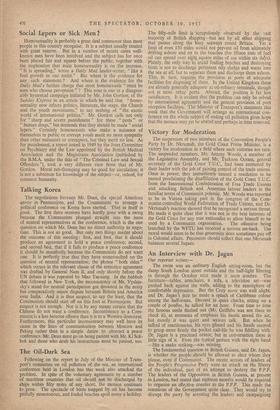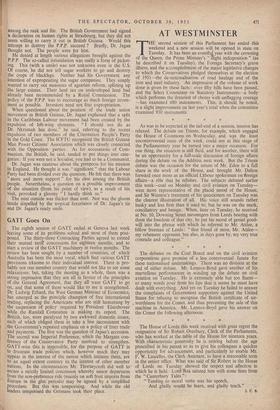An Interview with Dr. Jagan Our reporter writes:— The room
was an ordinary English sitting-room, but the damp South London street outside and the half-light filtering in through the October mist made it seem sombre. The furniture—tables, armchairs, a sofa, a television set—was pushed back against the walls, adding to the atmosphere of comfortable depression. But the Cozy stove was well alight, and Dr. Jagan's jazz tie made a splash of Caribbean colour among the half-tones. Dressed in quiet checks, sitting on a couple of pouffes, he talked for an hour. From time to time the famous smile flashed out (Mr. Griffiths was not there to check it), at moments of emphasis his hands sawed the air, but mostly, it was quiet and serious talk. But when he talked of reactionaries, his eyes glinted and his hands seemed to grasp more firmly the pocket nail-file he was fiddling with. Dr. Jagan is a practised orator, but in conversation there is little sign of it. Even the typical gesture with the right hand —like a snake striking—was missing.
The fundamental question in British Guiana, said Dr. Jagan, is whether the people should be allowed to elect whom they please, even if Communist. The recent arrests of leaders of the People's Progressive Party were an attack on the liberty of the individual, part of an attempt to destroy the P.P.P. The leaders of the Opposition in British Guiana, at present in London, had stated that eighteen months would be required to organise an effective counter to the P.P.P. This made the intentions of the Government quite clear. They would try to disrupt the party by arresting the leaders and campaigning among the rank and file. The British Government had signed a declaration on human rights at Strasbourg, but they did not seem willing to carry it out in British Guiana. Would this attempt to destroy the P.P.P. succeed ? Briefly, Dr. Jagan thought not. The people were for him. He denied at length various allegations brought against the P.P.P. The so-called intimidation was really a form of picket- ing. This (with a smile) was not unknown even in the U.S. Of course, he did not tell sugar workers to go and destroy the crops of blacklegs. Neither had his Government any intention of expropriating the sugar companies. They simply wanted to carry out measures of agrarian reform, splitting up the large estates. Their land tax on undeveloped land had already been recommended by a Royal Commission. The policy of the P.P.P. was to encourage as much foreign invest- ment as possible. Investors need not fear expropriation.
When questioned about the position of the trade union movement in British Guiana, Dr. Jagan explained that a split in the Caribbean Labour movement had been created by the expulsion of left-wing elements. " I should not do as Dr. Nkrumah has done," he said, referring to the recent expulsion of two members of the Convention People's Party in the Gold Coast. The ICFTU recognised the British Guiana Man Power Citizens' Association which was closely connected with the Opposition parties. As for accusations of Com- munism, the British, he said, tended to put things into cate- gories: If you were not a Socialist, you had to be a Communist. Dr..Jagan was cautious about the prospects for his mission in England. He thought it was " significant " that the Labour Party had been divided over the question. He felt that there was " more and more support " for his case among the British people. Nevertheless, a question on a possible improvement of the situation (from his point of view), as a result of his visit, provoked a gloomy I hardly think so."
The mist outside was thicker than ever. Nor was the gloom inside dispelled by the tropical luxuriance of Dr. Jagan's tie and Dr. Jagan's ready smile.



































 Previous page
Previous page